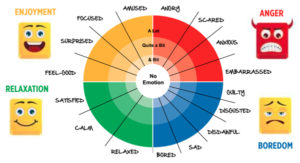Listen Now
Oh! Why are they so emotional? I often find myself saying this about my daughters. Women have a bad reputation of being overemotional or overly sensitive. However, I know some men who are emotional too. They just don’t dare express it the way women do.
The fact of life is that every single human has emotions and experiences ups and downs. Emotions need to be identified and processed to have better emotional health. It takes time and practice to go from emotional immaturity to emotional maturity (or emotional health).
I have found it very helpful to teach my kids better words for emotions so they can name their feelings and communicate them better. The chart gives you an idea.
The first thing to remember is that feelings are not facts. Feelings come from a response/reaction to a situation. Feelings are temporary. They are not cold, hard facts. Feelings can change.
Second, feelings are not needs that others need to meet. Just because you are feeling something doesn’t mean someone else needs to do something to change that feeling. An example of that is saying, “I am feeling stressed, so you need to get out of my face.” Instead, say something like, “I’m feeling stressed, so I need to go for a walk.”
Take ownership of your emotions since they are how you are responding. Your emotions do not come from someone else. When you feel thirsty, it is not someone else’s fault. It may be true that someone’s words or actions can lead to a certain emotional response in you, but they did not give that emotion to you.
Here are three great reasons why taking time out for yourself and learning more specific words to express your feelings with will benefit you:
1) You will better understand yourself.
Nothing is more frustrating than feeling like a crazy person when your emotions are all over the place. Take time to be aware of what is really going through your head and in your heart. Then give each feeling/emotion/attitude a name. Just call it what it is. (Swear words don’t count either.) Keep it simple. I’m feeling lonely. I’m feeling nervous. I’m feeling excited.
2) You will be more understood by others.
Nobody likes to be misunderstood. It is especially hurtful when someone assumes the worst in you. Practice sharing and voicing your true emotions.
If you ask my kids, they might admit that I can be a yeller. I yell when I’m having an overwhelming gush of negative emotions. So I too am working on naming my emotions so I can be understood clearly. “Kids, I’m feeling stressed and under pressure to get supper finished, so I need you out of the kitchen.” Or when I feel my husband is too focused on his phone, I need to give voice to my feelings, “I’m feeling ignored and unimportant because you have been looking at your phone so much this evening.” Now he understands why I’ve been upset all evening.
3) You will have better communication with others.
Great communication can be defined as what was understood, not what was said. When other people know how you are feeling, they can better understand what lies behind your behavior or actions. It goes both ways. When you understand what others are feeling, you can understand why they do what they do. Ask them questions to find out what they are feeling.
The following questions can help you and your family and friends become emotionally healthy. If after doing this exercise for a while you still struggle with your feelings, find someone you trust to talk with. Show them the chart and find a word that best explains how you’re feeling. Then talk about what led up to you feeling like that. You may find it easier to process your feelings better through talking with someone else.
THE NEXT STEP
Do this for 2-3 minutes at the end of each day. Then, when an emotional situation happens during the day, you will have the tools you need to handle it well.
First, take a deep breath. Quiet yourself so you can reflect and think back. Fill in the blanks.
“Today my main feeling was _______________ because ______________.”
Example: “Today my main feeling was accomplishment because I got four loads of laundry washed, folded and put away.”
You can take it a step further and list all the emotions you remember feeling throughout the entire day.
“Today I felt _______________ and _______________ and _______________ and _______________.”
To see a change or have better control of your emotions, decide how you will act next time.
“When ______________ (name the situation), I usually feel _______________.
Next time, I want to feel _______________.”
Giving your emotion a name as soon as you recognize will greatly help!
Here are some words and phrases you may use:
Enjoyment: Amused, Focused, Surprised, Feel Good
Relaxation: Satisfied, Calm, Relaxed
Boredom: Guilty, Disgusted, Disdainful, Sad, Bored
Anger: Angry, Scared, Anxious, Embarrassed







